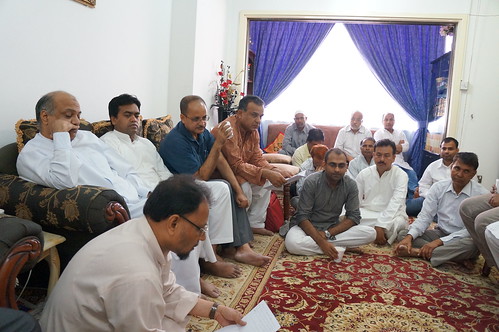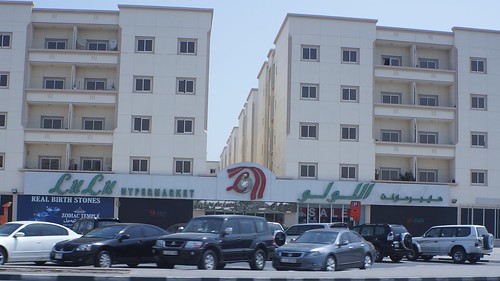By Kashif-ul-Huda, TwoCircles.net
Hundreds of thousands of Indians live and work in Emirates, more than half of them are Muslim. How is their future being shaped by past and present of India relations with this region? A three part series.
Part 1: Past Continuous
Part 2: Present Perfect:
India-UAE trade today is worth US$67 billion. These billions are the work of many small, medium and big business-men, women, and families. Indian Muslims have been an integral part of the business environment of the United Arab Emirates (UAE).
I asked S. M. Syed Khalil, Group Director of Jashanmal Group why is that Indian Muslims seemed to have done very well in Emirates but we don’t see similar level of success by Muslim businesses back in India? He says “In India, we suffer from discrimination by the government officials.” He also attributes success to no-tax regime of Dubai and relatively hindrance free business environment.
Salman Siddiqui, who is in perfume business and a long-time resident of Dubai, agrees with Mr. Khalil that business-friendly culture of Emirates does not discriminate and hence Indian Muslims just like others found it easier to establish and grow their businesses here.
But it is not just businesses and their jobs that keep these NRIs occupied. There are a number of cultural organizations that are very actively keeping the traditions and culture alive. Dubai Mushairas have been very popular since 1990s among both Indians and Pakistanis for quality of poetry recited as well as a way to bring finest poets from both nations on one platform year after year.
Mushairas have become so popular that now there are a number of mushairas throughout the year. Farhan Wasti is the General Secretary of Hamari Assosciation, they have been organizing mushairas for the last three years. Mushairas in Dubai depend on corporate funding; does this mean that only famous poets get the invitation? Wasti informed me that there is lot of planning that goes on into organizing a mushaira including careful selection of poets by scanning literary journals and recommendations.

Journalist Mazhar Farooqui with original MF Hussain painting.
But it is not just mushairas, plays, classical dances, and cultural programs in different languages that are patronized and appreciated by the Indian Diaspora that makes Dubai an important cultural center. When it became difficult for M.F. Hussain to live in India, he chose Dubai as his base. Dubai gave him freedom to work while remaining close to India in spirit and distance.
Journalist Mazhar Farooqui was close to MF Hussain and has many stories to share of the famous painter. He is writing a book but not about Hussain. In this day when everything is for sale, Farooqui has no intention to cash in on his time spent with Hussain. In fact, he is spending his spare time and money to give back to the community. Farooqui is the leading force behind Aaghaz Foundation, a group that is working in the field of education and empowerment in Lucknow.
Farooqui is not alone; many from Gulf countries actively participate in social work back home. They not only send money for social work but are really involved in grass-root level work trying to socially and economically uplift the community. I had the opportunity to sit in meetings of two organizations working in the interiors of Bihar & Jharkhand. Bihar Anjuman’s monthly meeting was held at a banker’s home, the organization is provided guidance by well-established professionals but I was happy to note that majority of the participants were young and recent arrivals to the Gulf. Bihar Anjuman through its online forum and offline meetings makes it possible to channelize the resources for supporting educational and economic needs in places whose names you will never hear in your life. Their coaching centres in remote areas are helping fulfill an education gap that is helping not just Muslims but also dalits and poor of the area.

Bihar Anjuman meeting.
People who established Bihar & Jharkhand International Forum (BAJI Forum) have been active in social reform movement since 1990s. I saw a bit older crowd in this meeting but enthusiasm was no less. Members of BAJI forum are active in anti-dowry and anti-drug campaigns. They are also financially supporting coaching centers helping stem the high drop-out rates.
There are similar organizations set up by people from Kerala, Karnataka, Maharashtra, etc concerned about their community back home and spending time and money to help in the social and economic upliftment of their community. This is not to suggest that regional affiliation dominate social gatherings, Dubai Indian Islamic Centre brings all Indian Muslims on one platform and works with both Government of Dubai and Indian Consulate serving the needs of Indian Muslims in Dubai.
But this present is not perfect for others who came here as laborers or low-skill workers and with dreams to earn some money. Thousands of these workers work long hours and live in inhuman condition working to make the Emirates what it is today. Journalist Mohammed Saifuddin has looked at the problems of migrant workers in his book “Expat Ride.” According to him, seventy percent of those who commit suicide in 2009 in Dubai are Indians.
Thus the story of Dubai is stories of many who succeeded and also many who have lost. But it is also encouraging to see those that have done well in life thinking of the less unfortunate ones and trying to do something for them.
Links:
http://www.aaghazfoundation.com/
http://biharanjuman.org
http://bajiforum.com/
http://www.diic.org/
Photos

BAJI Forum meeting.

Working outside in the heat

M.A. Yousuf Ali’s Lulu Hypermarket is a success story.

